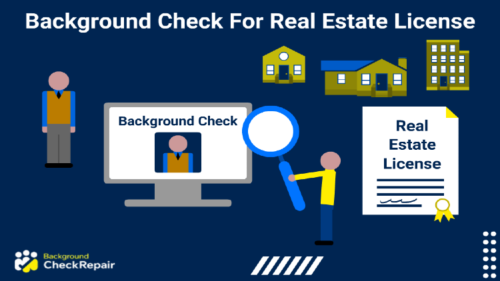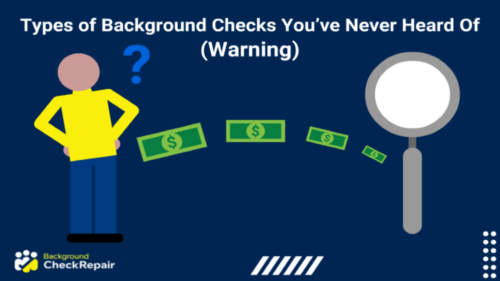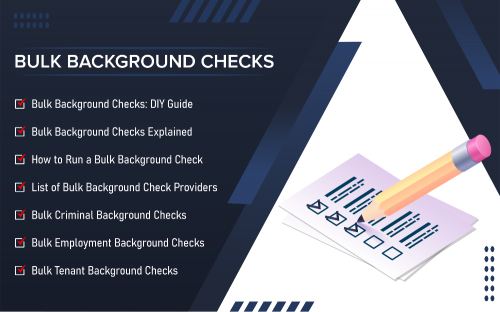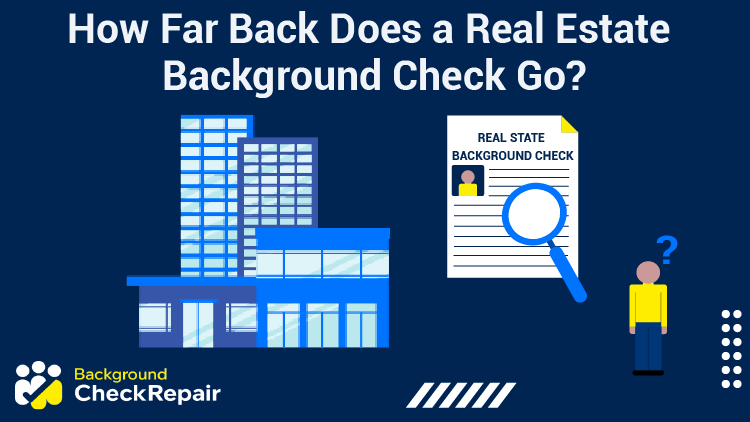
The housing market is constantly evolving as people rapidly buy and sell in the quest for the perfect forever home, and the real estate industry continues to boom with more people than ever seeking real estate licenses and wondering, how far back does a real estate background check go?
Real estate agents hold a position of trust with clients, often having open access to homes and inside knowledge of a family and its needs. But the background check is determined by state law.
Since most background checks examine criminal history for a number of years (and professional licenses use fingerprints to search national records) knowing how far back does a background check go can save time.
Real estate background checks are essential to ensure that these individuals are trustworthy, and aspiring licensees may wonder whether the most recent 7 or 10 years of their history will be examined through during this process.
This complete guide answers how far back does a real estate background check go by state.
What Is the Background Check for Real Estate License?
Anyone who has ever asked “What is the background check for a real estate license?” probably wants to know two main things: what type of background check is used for real estate licensese and how far back does a real estate background check go.
Background checks are an important part of the process for real estate agents because home buyers and sellers want to work with professionals they can trust.
The specific type of background check used by a real estate agency varies somewhat from state to state and between agencies but will always include identity verification, professional license verification, and a criminal background check.
Real estate background checks commonly request driving records (MVR report), as well.6
The real estate background check is typically a level 2 background screening that investigates criminal records at the local, state and national levels.
These background checks require real estate applicants to provide their fingerprints, which are then submitted to state law enforcement and the Federal Bureau of Investigation.18
How Far Back Does a Real Estate Background Check Go?
This leaves the question of how far back does a real estate background check go. Again, there is some variance depending primarily on the state of residence, and many are wondering whether 7 or 10 years is the most common lookback period.
First of all, it is important to note that criminal background checks can legally look back indefinitely to investigate an individual’s criminal record (except for arrests and non-convictions which are limited to 7 years by the FCRA).17,19
So even though most real estate background checks look at the most recent 7 years of an individual’s criminal and court records, exceptions can be made, and a real estate agency may elect to look back further at their discretion.6
What Is the DBPR Background Check?
In the state of Florida, professional licenses are issued through the Department of Business and Professional Regulation (DBPR), and a DBPR background check is necessary to become a licensed real estate agent.
To obtain a DBPR background check, applicants typically will be required to submit their fingerprints. They may do this directly to the Florida Department of Law Enforcement or by using an approved print scanning service or site.
Once the FDLE has received the fingerprints and checked them against their crime databases, they will submit their report back to the DBPR for review.12
How Far Back Does TREC Background Check Go?
The Texas Real Estate Commission (TREC) regulates real estate licensing and background checks for the state of Texas.
Most TREC background checks will look back a minimum of 7 years into an individual’s criminal and personal history but can go back further at their discretion.
How Long Does TREC Background Check Take?
Anyone who has had to wait patiently for the results of a background check to come back knows how unnerving it can be. Texas residents may be wondering how long does TREC background check take.
A real estate background check is typically a fingerprint background check which can take a bit more time than a standard level 1 check. However, digital fingerprinting services can make this process go much more smoothly.
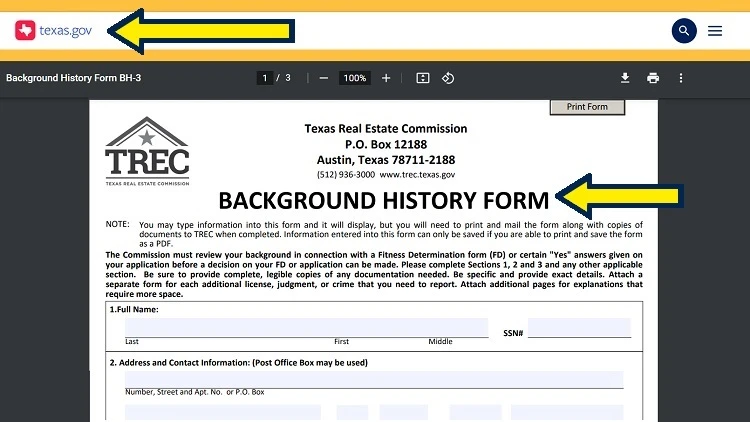
TREC background check form can be completed online and submitted to the board of license commission.
The Texas Real Estate Commission encourages digital fingerprinting through MorphoTrust Enrollment Services because a fingerprinting appointment can usually be scheduled within a few days, and background check results can be returned in as little as 1 to 3 days.20
In contrast, individuals can submit “Hard Card” fingerprints, but the processing time for these can take several weeks.16
In summary, with digital fingerprinting, a TREC background check can be completed and processed in approximately one week.15
What Is the TREC Background History Form?
The TREC Background History Form is a document that individuals are sometimes required to submit as part of their license application to the Texas Real Estate Commission.21
Any individual who has participated in an unlicensed activity or who has a real estate license in another state or other professional/occupation license must complete the background history form.
Additionally, any person who has a criminal record, pending judgments or lawsuits, or who has been involved in a professional license disciplinary action or criminal investigation must also complete the form.3
The TREC Background History Form allows/requires the applicant to address each of these domains individually and provide documentation.
Can a Felon Be a Real Estate Agent in Texas?
This leads to the question “Can a felon be a real estate agent in Texas?” The short answer is YES, though this is not an absolute which applies to every situation.
In Texas, real estate applications are evaluated on an individual basis according to the TREC Chapter 531 Canons of Professional Ethics and Conduct.
Any individual who has a criminal history is encouraged to submit a Fitness Determination form through the TREC Online Licensing Service prior to submitting their real estate license.22
Once all documentation has been received, TREC usually reviews the FD within 30 days and can provide an individual with the likelihood of their being approved for a license.
After completing the FD process, an individual may elect to proceed with their application based upon TREC’s recommendation.
TREC reviews the individual’s application, including the TREC Background History Form to determine the strength of the relationship between the crime and the responsibilities of a license holder.2,17
What Are the Background Requirements for Real Estate License?
Plenty of people have wondered about the basic background requirements for real estate licenses. While this can vary someone depending on the commission rules in the state of residence, applicants are typically required to have:8
- Minimum age of 18 years
- A high school diploma or G.E.D.
- Completed a specified number of college real estate courses or
- Completed a specified number of real estate pre-licensing education hours
- Completed a level 2 background check
- Passed the licensing exam
- Applied for licensure within a specified time window of having passed the exam.
How Long Is the Background Check for Real Estate License Good For?
A background check for real estate license is a common practice in recent years and is even required by law in most states.
Many states require that individuals undergo an FBI background check conducted by the state’s law enforcement agency (e.g. Florida Department of Law Enforcement).23
One of the inquiries that most people have when it comes to background checks is whether someone can run a background check without my permission. They are concerned about what will show up on their record.
Because of the anxiety it caused, some people are now looking for information on how to run a criminal background check on themselves. Being prepared can really be helpful when it comes to applying for a license.
According to the Kentucky Real Estate Commission, FBI reports generated for background check purposes expire 90 days after the issue.7
However, if the individual’s background check is cleared and they receive their licensure, they can expect the background check results to be valid for approximately one year (see Nebraska Real Estate Commission).
Many real estate agencies and state commissions require annual background checks to ensure that no issues arise.13
How Far Back Does a Real Estate Background Check Go in Each State?
Knowing that background check laws and restrictions vary from state to state, many people may wonder how far back does a real estate background check go in each state. Although there is no universal formula, in most states a real estate background check can be expected to go back at least 7 to 10 years.
For example, the Kentucky Real Estate Commission is required to investigate any application with a misdemeanor conviction from the previous 5 years or a felony conviction from the previous 10 years to determine fitness. Similarly, the Colorado Division of Real Estate requires applicants to self-report and explain any criminal cases within the past 10 years.24
The Oklahoma Real Estate Commission may be one of the strictest, going back as far as 20 years to investigate a criminal past.25
Real Estate Background Check and Requirements: What Disqualified You From Being a Real Estate Agent in Each State
See a complete list of states in the table below.
What Disqualifies You From Being a Real Estate Agent?
What disqualifies you from being a real estate agent varies from state to state with each state’s differing laws and real estate requirements. In general, there are three scenarios that could prevent an individual from obtaining their real estate license.
Scenario 1
The individual does not meet the basic requirements for the type of license they are seeking. In most states, a minimum age of 18 and a high school diploma are required to pursue any real estate license.
Additionally, each state has specific real estate courses or training that is required. Finally, an individual must be able to pass the appropriate licensing exam.
Scenario 2
The individual’s behavior or actions do not meet the standards of integrity set forth by the Real Estate Commission.2 For example, individuals who are dishonest about their background or who cheat on the licensing exam will likely be disqualified from being a real estate agent.
Scenario 3
The final scenario, most relevant to the following sections, is when an individual’s criminal history check returns evidence of a criminal past that bears upon the licensure being sought.
DRE List of the Most Common Disqualifying Convictions
Following up on Scenario 3, many people are looking for more information about how a criminal record bears upon their potential licensure, and this is where the Division of Real Estate (DRE) list of the most common disqualifying convictions comes in.
Most states have their own versions of this list, and the most consistently present disqualifying convictions are those of a violent or sexual nature and crimes of dishonesty such as fraud or theft. Below are a few examples of states’ lists.
Can You Get a Real Estate License With a Felony Conviction?
Having explored the question of how far back does a real estate background check go and established that 10 years is the most commonly seen time frame across the states, individuals with felony convictions older than 10 years may be able to pursue a real estate license, particularly if their felony crime was not one involving violence or deceit.
To find out if can you get a real estate license with a felony conviction within the last 10 years, an individual needs to know the laws in their state (see table above).
While states weigh criminal offenses within the most recent 7 to 10 years more heavily, most states look specifically at how the individual crime bears upon the responsibilities of the real estate career path.
For example, in California, §2910 Article 18.5 outlines the “Criteria for Substantial Relationship,” providing clear examples of relevant offenses.4,11
Additionally, many states allow individuals to apply for a waiver and take other steps to demonstrate their trustworthiness, such as appearing before the Commission for a hearing (see Kentucky Real Estate Commission FAQs) or obtaining a Certificate of Good Conduct (see New York State Certificate of Relief/Good Conduct & Restoration of Rights).1, 7, 30
However, in any state, the type of felony crime is going to be the most critical factor, as the most severe felonies (e.g. murder, rape, embezzlement) are typically not eligible for waivers.17
Can I Get Real Estate License With Felony Charges?
It’s understandable that a felony conviction on an individual’s record can give an agency, real estate commission, or client significant pause but what happens when someone is charged with a felony crime but not convicted? Many ask, can I get real estate license with felony charges against me?
In truth, the Real Estate Commission’s response to felony charges depends mainly upon the laws in that state.
The state of California, for example, does not allow disciplinary action to be taken against a licensee until they have been found guilty of or sentenced for the crime (see The Department of Real Estate California FAQs).4 This does not directly address the scenario where an individual is trying to get licensure, and each such case is reviewed individually (see California SB-800).31
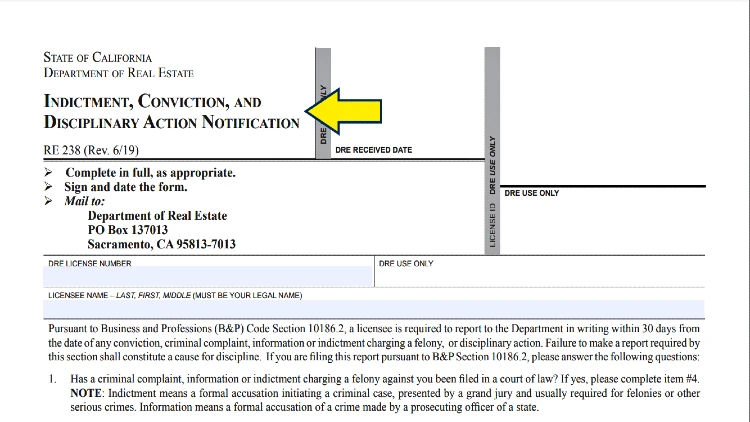
Depending on the type of crime and how long ago it occurred, each state has specific rules about obtaining a real estate license.
Individuals attempting to obtain first-time licensure will be expected to disclose and explain any pending charges against them during the background check process.
The Commission is responsible for determining whether to allow the application to proceed.5
Can You Get a Real Estate License With a Domestic Violence Charge?
Many people also want to know “Can you get a real estate license with a domestic violence charge?” The answer to this question depends upon several factors, such as:
- How old is the charge
- Whether the charge resulted in a conviction
- Whether the conviction was a misdemeanor or felony
- If it was a one-time or repeat criminal offense
- The state where the license is being sought
- Other extraneous factors such as character references, evidence of good conduct, etc.
To summarize these points, a single domestic violence charge which led to a non-conviction or a misdemeanor conviction is less likely to prevent an individual from obtaining their real estate license than serious, repeat DV convictions.
Can I Get Real Estate License With DUI on My Record?
Driving under the influence (DUI) is among the most prevalent criminal mistakes, but it is a crime that is taken very seriously in the majority of states, begging the question “Can I get real estate license with DUI on my record?”
According to the Kentucky Real Estate Commission, a single DUI is unlikely to preclude licensure, but a pattern of irresponsible or untrustworthy behavior will. A DUI conviction is less likely to be problematic when it was a one-time misdemeanor-level offense that occurred several years ago.7,17
Can You Get a Real Estate License With an Expunged Record?
Having a criminal record expunged or sealed is always a good idea when possible, and the majority of states have some sort of provision for expungement, providing certain conditions are met.
Persons who have left their criminal lifestyle far behind them may be wondering “Can you get a real estate license with an expunged record?”
The good news is that once a criminal record has been expunged or sealed, it should no longer show up on the criminal record checks conducted for real estate licensure.
Furthermore, expungement provisions often require a specified period of time to pass before an expungement can be granted, and a longer period of time further improves an individual’s prospects for achieving licensure.
What States Allow Felons To Have Real Estate License?
A felony offense does not automatically disqualify an individual from obtaining their real estate license, and many people are interested to know what states allow felons to have real estate license. The good news is that every state allows felons to obtain licensure when certain conditions are met.
These conditions may (but not necessarily) include:14,17
- Passing of a specified period of time (typically 2 to 10 years after sentence completion)
- Obtaining a waiver for said crime
- Appearing before the commission or review board for a hearing
- Providing documentation of character
- Obtaining a Certificate of Good Conduct (or equivalent)
- Going through an appeals process
Note that certain severe, violent, or financial-related felonies such as sexual crimes, murder, fraud, and theft may not be eligible for waiver or appeals process.5
Buying or selling a home is a stressful time for any person, and clients need to work with real estate agents they can trust which is why real estate background checks are so integral to the licensure process. Aspiring homeowners and real estate professionals alike can consult this article for information about how far back does a real estate background check go.
Frequently Asked Questions About How Far Back Does a Real Estate Background Check Go





